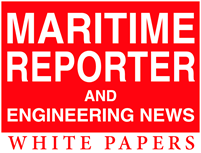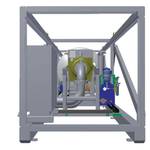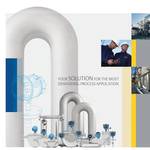
In Japan, there is a maritime industry cluster of businesses, which include ship owners, shipbuilding companies and ship machinery and equipment makers. New products have been developed, while others have been improved within the framework of this maritime cluster. Japan has completed many vessels of a wide variety of types for years. Boasting high levels of performance and quality, Japan-built ships are highly rated by ship owners worldwide.
The Japanese ship machinery and equipment industry has grown hand in hand with its compatriot shipbuilding industry to deliver many different kinds of high-end products in large numbers to customers all over the world. We work hard so that customers are able to use Japanese products safely for a long period of time, having prepared to provide after-sales services around the clock in an extensive service network that reaches every corner of the globe.
Today, demand for cargo transport by sea is growing everywhere on this planet due to, among other factors, the growth of the global economy and the development of new energies. In line with the demand increase, newbuildings are being completed one after another in Japan and other nations. As such, shipbuilders have a backlog of many orders, while the shipping and shipbuilding industries are blossoming continuously in many economies in the world.
Currently, countries and regions engaged in shipbuilding are inflating in number, while domestic shipping services are becoming more and more important in developing economies. Energy development projects are being advanced increasingly greater worldwide. These trends are all factors behind the rise in need for operating various ships. The Japanese ship machinery and equipment industry is now paying attention to the global market, which is expanding under the influence of this demand increase.
Japan Ship Machinery and Equipment Association (JSMEA) is currently made up of 244 regular and 69 supporting members. Our activities are all focused on upgrading the Japanese ship machinery and equipment industry. The specific efforts that we make to this end include the following: (1) participating in exhibitions overseas and organizing seminars worldwide to promote member companies’ products, services, technologies and other features; (2) helping member companies develop technologies to upgrade the reliability of their products so that they can comply with international conventions and ensure higher safety for vessels; and (3) secure and cultivate human resources to constantly enhance the quality of Japanese ship machinery and equipment and Japan’s manufacturing technologies.
To encourage member manufacturers to expand their business in the global market, JSMEA participates in international maritime exhibitions held in Japan and other countries, providing up-todate information on members to ship owners, shipyards and other customers. At exhibitions, we promote a Japan pavilion with member companies to introduce members and market their products. We also distribute a booklet on energy-saving and eco-friendly products, which is a powerful advantage enjoyed by the Japanese ship machinery and equipment industry; another booklet that contains detailed information on products for offshore oil and gas development projects and facilities; and a newsletter that introduces JSMEA activities and the latest information on member companies.
In developing nations where local markets are scaling up as well as those where we think the shipping and shipbuilding businesses are expected to expand in the future, in particular, JSMEA organizes seminars to provide up-to-the-minute information to customers and introduce affiliated ship machinery and equipment manufacturers and their products. As member companies unveil the latest information, our seminars are always attended by many local parties involved with maritime affairs, who look on the occasions as opportunities to have interchanges with members.
While abroad for exhibitions and seminars, JSMEA visits ship owners, shipbuilders and other local organizations to exchange upto-date information and conduct other activities to introduce member manufacturers.
The recent enhancements in international conventions have required the global maritime industry to comply with more rules and regulations. As such, needs are rising for new technologies and products. Moreover, we are becoming more and more aware of environmental issues attributed to factors including global warming and the issue of ballast-water treatment. At a time when circumstances surrounding ship operations are changing as drastically as described in the foregoing sentences, JSMEA assists member companies in developing new technologies and products. To help them invent more practical technologies, for example, we promote the development of technologies that precisely satisfy the needs of ship owners, shipyards and other customers. To meet the next stage of NOx emission regulations, Japanese ship machinery and equipment makers made concerted efforts to develop new technologies and products. Currently, we are striving to standardize telecommunication technologies for onboard devices to ensure greater safety for ships by consolidating onboard data and organically orchestrating on-board equipment.
JSMEA actively promotes member companies and their ship machinery and equipment to develop products that better satisfy customer demand and allow members to hold a greater share of the global market. Information on JSMEA-affiliated manufacturers is available at the international exhibitions that we attend and at our seminar, but also you may find it on our Web site. So, when needing to know the latest about JSMEA members as well as their products and services, please visit our Web site and/or contact us directly.
Japan Ship Machinery and Equipment Association (JSMEA) has published a booklet called “Japanese Marine ECO-Products”, which introduces products that member companies manufacture and sell that contribute to saving energy and helping the environment. Copies are distributed widely among ship owners and shipbuilding companies worldwide.
The “Japanese Marine ECO-Products” booklet carries information on more than 40 items, such as engines, propellers and other energy-saving products as well as emission-gas and ballast-water treatment systems and other ecologically friendly products. As such, the booklet is a useful reference when ship owners, shipyards and other customers select machinery and equipment for new projects, as it contains product features and specifications as well as contact and other information.
The online edition of “Japanese Marine ECO-Products” is available at http://www.jsmea.or.jp/eco-products.
Energy Saving, CO2 Reduction,Power Reduction, Environmental Loading Reduction
Realize the reduction of CO2 emissions, will contribute greatly to the global environment.
Inverter control of FAN Can obtain a greater energy savings by setting the rotation speed of the wind amount corresponding to each operation mode “cooling”, “heating” and “blast”, and improves the comfort of the accommodation space. Compared with the damper controlled, there are about 57% reduction of the ratio in the energy equivalent. And there is a reduction of 53.1ton CO2 / year.
Inverter control of COMPRESSOR Control by an inverter the rotation speed of the COMPRESSOR. It is effective to keep the operation stable and to reduce power.
Tel : Fax :
E-mail : ushio@ushioreinetsu.co.jp
Autopilot Fuel Saving, Safety, Accuracy, Reliability of Information
The model PR-9000 is the latest autopilot system from TOKYO KEIKI. The PR-9000 is designed using the latest technology from a wealth of engineering and manufacturing experience of navigational instruments. Safety, accuracy, and reliability of information have been enhanced in our model lineup thereby significangly improving situational awareness and navigational safety.
An indispensable autopilot system providing effective and safe bridge resource management and energy efficeint navigation.
Repeater Unit with color LCD
Color LCDs are incorporated into each system which enhances reliability of information and improves situational awareness.
Maintaining Safe Navigation via Guidance Screen
Steering-related monitoring information can be displayed on the monitor screen. If a warning alert is generated, the navigator can simply view the proper guidance procedures on the screen in order to carry out evasive measures.
Route Control function (ACE) Route Control is performed only with Autopilot
Due to reduced route deviation / shorter sailing distance / reduction of wasted rudder,it ultimately contributes to safety and energy efficient navigation.
Marine Systems Company
Tel : Fax :
Inquiry https://www.tokyo-keiki.co.jp/form/webform_marinee.html
Fuel Saving
PT900 is the next generation autopilot, modern controlled fuel saving function (BNAAC/E-COurse Pilot) is installed. By introducing 7 inches LCD, navigation information and autopilot parameters are confirmed and changed very easily.
Marine Equipment Business Division
Tel : Fax :
E-mail : navigation_info@ydk.yokogawa.co.jp
Ballast Water, Bwts, Bwms, Filtration, Electro-Chlorination, Electrolysis, Electrolyzation, UV, Ultra Violet
Ecomarine Technology Research Association (ETRA) run by Hitachi Zosen Corporation and Sumitomo Electric Industries Ltd., has developed an electro-chlorination Ballast Water Treatment System (BWTS) "ECOMRINE EC", maximizing the combination of the excellent filtration technology by Sumitomo Electric and the sophisticated electrolytic technology as well as the expertise regarding ship structure by Hitachi Zosen.
We are planning to reorganize ETRA into a joint-stock company upon the acquisition of IMO type approval and then introduce ECOAMRINE EC systems with high efficiency and low power consumption into the market, together with an UV type BWTS "ECOMARINE UV" developed and marketed by Sumitomo Electric.
Tel :
E-mail : wt-bwts@mml.is.hitachizosen.co.jp


Accurate, on-the-spot measurement of marine bunkering is critical for both cost control and relationship management. The Micro Motion® Certified Marine Bunker Measurement Solution (CBMS) provides highly accurate data plus a bunker ticket that is available immediately after the bunker is complete. Depending on the implementation, the bunker measurement is certified by Nederlands Meetinstituut (NMi), the notified body for testing to the guidelines of the European Instruments Directive (MID) and Issuing Authority for OIML (International Organization for Legal Metrology). The Micro Motion meter meets the OIML standard R117-1 and the overall solution meets MID Directive 2004/22/EC Annex MI-005. During a meter trial, the Micro Motion system is frequently compared to the existing volumetric system, or to the volumetric system used by the other party. The comparison typically yields discrepancies that mistakenly call the new system into question. This white paper provides a brief overview of the Micro Motion Certified Marine Bunker Measurement Solution, then examines all the sources of measurement discrepancy and demonstrates that the apparent issues can be caused by a combination of the inherent uncertainties in volumetric measurement and inconsistent bunkering procedures. When appropriate bunkering procedures are followed, the Micro Motion system provides superior accuracy and should be used as the standard. The use of mass flowmeters (MFMs) is becoming standard practice in the transfer of marine fuel. The Marine Port Authority (MPA) of Singapore, which represents a large share of the global bunkering market, announced in April 2014 that the use of MFMs would be mandatory by the start of 2017. MFMs reduce the number of quantity disputes, eliminate time spent performing sounding operations before and after the delivery, and provide suppliers with powerful diagnostic tools for improving their processes. In addition, the MFM can provide the user with additional process metrics that help to prove the accuracy of their delivery quantities as well as their product quality. It is easy to see why MFMs are becoming the industry standard. ExxonMobil Marine Fuels & Lubricants was the first bunker fuel supplier in the marine industry to use a MFMS that has been approved by the Maritime and Port Authority of Singapore for bunker fuel deliveries.